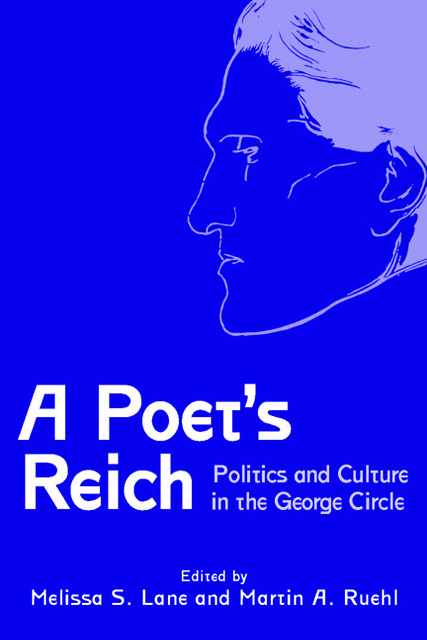8 - Political Economy as Geisteswissenschaft: Edgar Salin and Other Economists around George
Published online by Cambridge University Press: 10 February 2023
Summary
The Aim Of This Essay is to examine the role of the economists among Stefan George’s followers and the more distant associates of his Circle. Many of those followers — in my view the best and closest — either emigrated after 1933 or eventually joined the opposition against Hitler and the Nazi regime. That they included a large number of economists is striking not least because George, having rejected the socio-economic corollaries of modernity, did not contemplate any alternative models of economic organization. He did not call for a planned economy nor did he envision any economic utopias, and he did not decry any specific aspects of the capitalist system. Neither did he seem particularly interested in the so-called irrational aspects of the economy, such as entrepreneurship, or the fateful effects of economic crises. The principal objects of George’s criticism were commercialism and materialism. In his poem “Der Krieg” (1917), he presents the economic sphere, which he associates with “Sachwalter, händler, schreiber — pfiff und zahl,” as the opposite, indeed the negation of, the realm of poetry. George had already denounced the existing economic system in Der Stern des Bundes (1914), where he projects a vision of the good life that is fundamentally at odds with the utilitarian considerations of professional economists.
This essay investigates the ways in which the economists around George dealt with this tension. In particular, it seeks to determine whether George’s influence prompted his followers to project alternatives to the economic status quo in contemporary Europe, indeed whether it had any impact at all on their scholarly work. Their responses, as we shall see, were extremely varied — so varied, in fact, that it is necessary to consider them in the context of their individual biographies. The essay begins with a detailed discussion of Edgar Salin, arguably the most influential economic theorist to emerge from the Circle, certainly one truly attached to George. It then considers, somewhat more briefly, three economists — Friedrich Wolters, Arthur Salz, and Kurt Singer — who were more remote either from the field of political economy (Wolters) or from George and his Circle (Salz and Singer).
- Type
- Chapter
- Information
- A Poet's ReichPolitics and Culture in the George Circle, pp. 164 - 203Publisher: Boydell & BrewerPrint publication year: 2011
- 1
- Cited by

